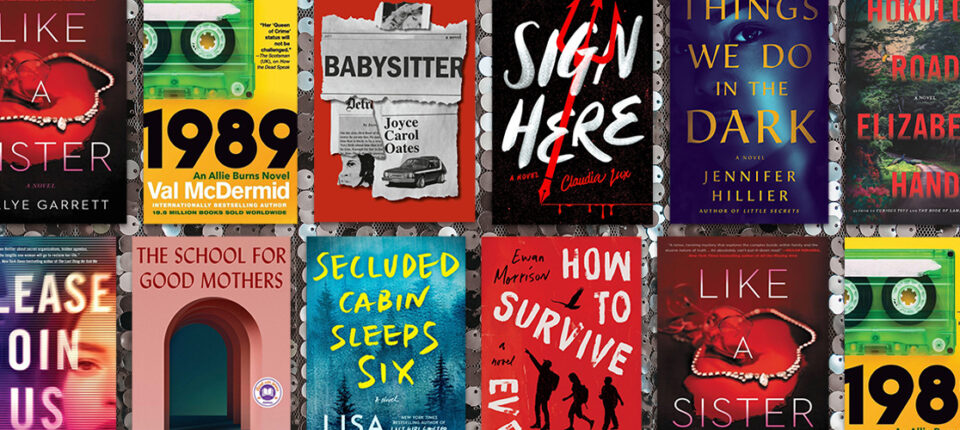Here they are: my top ten thrillers, and a few other outstanding crime books and TV shows.
___________________________________
Top Ten Psychological Thrillers
___________________________________
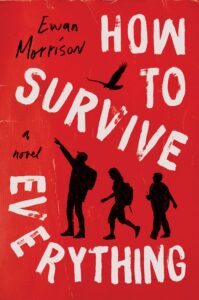
Ewan Morrison, How to Survive Everything
(Harper Perennial)
Ewan Morrison wins the most memorable title contest of the month, though I do fear for anyone who mistakes this thriller for a handbook. Haley and Ben Crowe live with their divorced mother, but in the face of a new, even deadlier pandemic their father wants to take the children and go into hiding NOW. Yes, it’s a prepper thriller—the first I’ve encountered since we had a real-life lockdown that must have made those who stockpile food and ammo do victory dances fist-pumping and shouting I was right! in their saferooms. Dad kidnaps Haley and Ben, whisking them over the river, through the trees, and far off the grid. The kids are determined to escape and get back to their mother, but what if the scarier and scarier things their deranged father tells them about the old world is true?
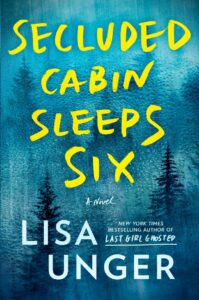
Lisa Unger, Secluded Cabin Sleeps Six
(Park Row)
Lisa Unger consistently turns out excellent thrillers, and this one is top-notch: in a season lousy with secluded cabins, I will remember the super luxe Elegant Overlook, nestled in a hamlet called Sleepy Ridge. The six in the cabin are Hannah and Bruce; Hannah’s BFF Cricket and her new boyfriend; and Hannah’s brother Mako, a tech zillionaire who has arranged the weekend, and his wife, the yoga influencer Liza. Even in the height of luxury, the vacation is not quite what Mako hoped: the caretaker is too attentive, Cricket’s boyfriend is, well, too attentive, and Hannah thinks Bruce is having an affair. At least there’s a private chef.
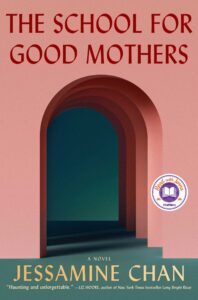
Jessamine Chan, The School for Good Mothers
(Simon & Schuster)
Any of you ever argued about how many literary books are actually thrillers? I think of it as the Celeste Ng argument (or the Dostoyevsky argument, or the Gatsby argument) but the overlap between literary and thriller is quite large once you start thinking of all the classics which have crime as a device or an engine. In the case of Chan’s devastating debut, I thought about The Handmaid’s Tale. I thought about 1984, and I thought about the more recent Red Clocks by Leni Zumas. But I also thought of great nonfiction books about surveillance and poverty, like Matthew Desmond’s Eviction or Adrian Nicole LeBlanc’s Random Family. But back to Chan’s book with its simple premise: A mother is having a very bad day, made worse by the interference of social workers and their mandate to investigate child abuse and neglect. Chan’s execution of her all too relatable story is a novel so good it feels like life, and so terrifying I wished for less verisimilitude.
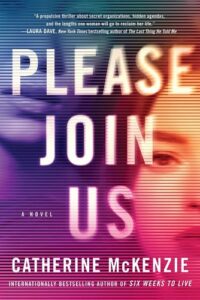
Catherine McKenzie, Please Join Us
(Atria)
I didn’t expect Please Join Us to keep its grip on me, but it did. The protagonist, Nicole Mueller, is a disgruntled corporate lawyer. Her marriage is not as great as it was, and neither is her career thanks to an archaic system of promotions. It has several things I usually like—a secret society for women who feel like The Man is keeping them down; a realistic desire to hold on to an apartment owned by an elderly aunt in New York City; and did I mention The Man and the apartment? Not a breezy read, but a good one for people hungry for a solid conspiracy theory about women’s empowerment.

Elizabeth Hand, Hokuloa Road
(Mulholland)
I would follow Elizabeth Hand anywhere, and her new standalone thriller is set in Hawaii. But this is not the Hawaii of umbrella drinks and squabbling newlyweds. Hand writes about the people outside the tourist orbit, people rich enough to buy privacy on a small island. Hokuloa Road is lined with mansions hiding behind expert landscaping, and Grady Kendall signs on to work at one of the estates. Grady finds something amiss: for one, people keep disappearing from the area. Hand loads the book with lots of atmosphere and just enough to keep a scared reader reading

Jennifer Hillier, Things We Do in the Dark
(Minotaur)
“There is a time and a place for erect nipples, but the back of a Seattle police car definitely isn’t it.” I love the first line of this book so much I posted it in on my social media feeds and saw later that her marketing people were either following my lead or miffed that I stole their thunder. No matter. The book is as promising as its opener: a potent mixture of old-school thriller and new-school celebrity worship.

Claudia Lux, Sign Here
(Berkley)
Sign Here made me miss The Good Place—an unfair comparison as The Good Place ranks very high for me but a valid one. Sign Here also outlines an afterlife where the residents are functionaries, responsible for recruiting wayward, bumbling live people into the ranks of the population of hell. There is a point system that rewards recruiters for swooping up multi-generational family members, and Peyote Trip (called Pey) is pretty good at his job in the Deals department. But when his plans to convert the Harrison family start to go awry, he enlists the help of an eager new co-worker, Calamity, to help on his quest. But both Earth and Hell contain secrets Pey will have to divine in order to make his plan a reality.

Joyce Carol Oates, Babysitter
(Knopf)
I can’t remember the last time I read a book with the excitement and tension of Babysitter. It’s too easy to joke about Oates’s wondrous pace of production and to forget that she is a master at pretty much everything including domestic suspense. The backdrop of Babysitter is a series of child murders in the ritzier suburbs of Detroit in the 1970s. Everything crackles: the characters, the plot, she even pumps some new life into the serial killer trope. True story: I once decided to write an essay on failure and dropped it when I found not only had Oates written it, she wrote a better essay than I would have dreamed. Lucky I wasn’t planning on writing a serial book this summer.
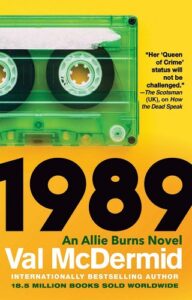
Val McDermid, 1989
(Atlantic Monthly Press)
OK, we can argue all you want about the innovative structure veteran McDermid has chosen for this series, but I think it’s genius. In writing an installment about her newspaper reporter-protagonist, Allie Burns, every ten years. In 1979, we met Allie and followed her through the confusion and hazing of a novice reporter. Ten years on, there is plenty to keep her busy—the aftermath of the crash of Pan Am Flight 103, a hot story about HIV/AIDS, and the descent of papers like hers into lurid tabloids. It’s hard not to like a McDermid book, and she’s made Burns much more likable and complex in this outing. Bring on 1989!
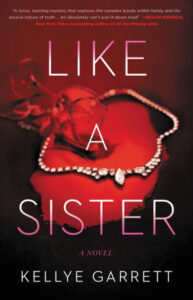
Kellye Garrett, Like a Sister
(Mulholland Books)
Let’s talk about why Like a Sister is one of the best books of the year. The novel is about an influencer-slash-reality TV star, a young black woman named Desiree Pierce who is found dead at a playground in the Bronx near the apartment where her estranged half-sister, Lena Scott, lives. The press is quick to brand Desiree a drug addict and to label her death an overdose, but Lena refuses to believe that story. Instead, she investigates her sister’s recent life as well as her death to piece together what Desiree had been up to since their estrangement. Lena’s findings implicate their father, a hip-hop mogul (I kept picturing Terrence Howard) and as family secrets surface Lena persists in her quest for the truth. What makes the book a standout is Garrett’s command of her idioms: the public’s lust for salacious information about social media and reality TV stars, people whose lives are constructed for maximum public involvement, as well as the rivalry between two sisters who have chosen very different paths. That Garrett uses hip-hop, with its bragging, beefs, and stupid money as a backdrop is a clever, clever stroke which gives Sister added texture and nuance. Get on the Garrett train now—she is a writer who is going places, and I for one can’t wait for the next ride.
___________________________________
Top Ten Other Things
___________________________________
Erica Krouse, Tell Me Everything (Flatiron)
Not only the best crime memoir I read this year, but one of the best I can remember.
Netflix Is the New Lifetime: Programming for Women Who Like Crime
When I had my bout with Covid this fall, I made a startling discovery besides the fact that I am capable of three naps in one day. The Lifetime movies that I have loved so hard have been reinvented for Netflix. All the elements are there: an unusual woman in peril (Killer Sally) or a woman who puts others in peril (con artist Anna Delvey in Inventing Anna); crime in a fuzzy legal area like revenge porn (The Most Hated Man on the Internet); and a few excellent studies of unusual crimes perpetrated by women (Bad Vegan).
Kathleen Hale, Slenderman (Grove)
Hale’s account of the violent attack two tween girls perpetrated on another is a tragic and spooky story of adolescence and Creepypasta.com
Grace Ellis and Hannah Templer, Flung Out of Space: Inspired by the Indecent Adventures of Patricia Highsmith (Abrams)
If you are a comic and Highsmith fan, this is the present for you. Go on, treat yourself.
Alex Segura, Secret Identity (Flatiron)
Segura’s clever novel about a murder in the 1970s comic book scene is the perfect companion to Ellis and Templer’s book. You can buy just one more book, right?
John Tresch, The Reason for the Darkness of the Night: Edgar Allan Poe and the Forging of American Science (FSG)
A study of a writer I find endlessly inventive by a curious and sharp historian of science.
Untold: The Girlfriend Who Didn’t Exist (Netflix series)
The Untold series is ostensibly about sports, but I am proof you can loathe sports and still enjoy this provocative and thoughtful series. Girlfriend is a standout: a complex catfishing case involving Notre Dame football, a gifted player, and the Samoan-American culture he was raised in and retained strong ties to. As close to a classy catfishing story as I’ve ever been.
Louise Penny, A World of Curiosities (Minotaur) and Three Pines (Amazon series)
2022 was an excellent year to be a Louise Penny fan.
Patrick Radden Keefe, Rogues (Doubleday)
It’s always a pleasure to read Keefe, and this book shows off his ability to condense and concentrate on a criminal. As impressive as Say Nothing and Empire of Pain are, these short pieces, trimmed of all fat, are also knockouts.
Our Father (Netflix series)
This one is a flat-out humdinger. I don’t want to spoil it, but the gist is 23 and Me exposes a fertility doctor in Indianapolis—a very respected man in both the medical community and a deacon at his church—who did bad, bad things.

